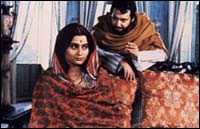Ghare Baire (film)
| Ghare Baire (The Home and the World) | |
|---|---|
 A poster for Ghare Baire | |
| Directed by | Satyajit Ray |
| Produced by | NFDC |
| Written by | Satyajit Ray, from thenovel by Rabindranath Tagore |
| Starring |
Swatilekha Chatterjee (Sengupta) Victor Banerjee Jennifer Kendal Soumitra Chatterjee |
| Cinematography | Soumendu Roy |
| Edited by | Dulal Dutta |
Release dates |
|
Running time | 140 minutes |
| Country | India |
| Language | Bengali/English |
Ghare Baire (The Home and the World) is a 1984 Indian Bengali romantic drama film by director Satyajit Ray, based upon the novel Ghare Baire by Rabindranath Tagore. It features Soumitra Chatterjee, Victor Banerjee, Jennifer Kendal (in her last film appearance) and Swatilekha Chatterjee (Sengupta). Ray prepared a script for it in the 1940s, long before he made his first film Pather Panchali. It deals with a subject that has often appeared in Ray's work: the emancipation of women and what it does to them and to the men who love them.[1] The film was in competition for the Palme d'Or at the 1984 Cannes Film Festival.[2]
Plot synopsis
The story is set in early 20th century India (specifically, 1907) in the estate of the rich Bengali noble Nikhilesh (Victor Banerjee) and in the chaotic aftermath of Lord Curzon's partition of Bengal into Muslim and Hindu states; the nationalist movement is trying to impose a boycott against all foreign goods (by claiming that imports are at the root of Indian poverty). He lives happily with his beautiful wife Bimala (Swatilekha Sengupta) until the appearance of his friend and radical revolutionist, Sandip (Soumitra Chatterjee).

Sandip, a passionate and active man, is a contradiction to the peace-loving and somewhat passive Nikhil. He easily attracts the innocent and unsuspecting Bimala, creating a love triangle.
Although Nikhilesh figures out what is happening, he is a mature person and grants Bimala the freedom to grow and choose what she wants in life (as their marriage was arranged when she was a girl). Meanwhile Bimala experiences the emotions of love for the first time in a manner that helps her understand that it is indeed her husband Nikhilesh who really loves her.
Importantly, Nikhilesh tells Bimala that he would like her to have a life not only inside the home, but outside of it as well — a most controversial matter when the novel was written.
Cast
- Soumitra Chatterjee ... Sandip Mukherjee
- Victor Banerjee ... Nikhilesh Choudhury
- Swatilekha Sengupta... Bimala Choudhury
- Gopa Aich ... sister-in-law
- Jennifer Kendal ... Miss Gilby (as Jennifer Kapoor)
- Manoj Mitra... Headmaster
- Indrapramit Roy ... Amulya
- Bimala Chatterjee ... Kulada
- Master Ajay Ghosh
Other credits
- Art direction: Ashoke Bose
- Sound designers: Robin Sen Gupta, Jyoti Chatterjee, Anup Mukherjee
Production
In 1983, during the shooting of the film, Ray suffered two massive heart attacks. His son, Sandip Ray, completed the project from his detailed instructions.
Reception
The film did well commercially when initially released. Ray's heart attack may have played a role in this. For the Indian audience, there was an additional interest, since it featured the first full-fledged kiss in Ray's films.
Critical response was mostly positive. Pauline Kael wrote: "Toward the end, Bimala, who was [encouraged] into independence by her husband, becomes desperate to express that independence — recklessly, heedlessly. When it comes to truthfulnesss about women's lives, this great Indian moviemaker Satyajit Ray shames the American and European directors of both sexes."[3] Vincent Canby wrote in the New York Times: "As with the works of any great director, The Home and the World defies easy categorization. In close-up, it's a love story, but it's one so fully defined that, as in a long-shot, it also succeeds in dramatizing the events seen on the far horizon - including the political differences between Gandhi, who led the nationalist movement, and Tagore, who, like Nikhil, stood for civilized compromise."[4] Roger Ebert noted that the real story of the film takes place within Bimala's heart and mind. He added: "It is a contemplative movie -- quiet, slow, a series of conversations punctuated by sudden bursts of activity."[5]
Awards
- National Film Award for Best Feature Film in Bengali at 32nd National Film Awards[6]
- Best Supporting Actor (Biswajit dutt) at 32nd National Film Awards[6]
- Best Costume Design at 32nd National Film Awards[6]
References
- ↑ Pauline Kael, State of the Art ISBN 0-7145-2869-2
- ↑ "Festival de Cannes: Ghare Baire". festival-cannes.com. Retrieved 2009-06-23.
- ↑ Pauline Kael, State of the Art p. 382
- ↑ Canby, Vincent (21 June 1985). "Movie Review - The home and the World". The New York Times. Retrieved 8 February 2013.
- ↑ "The Home and the World :: rogerebert.com :: Reviews". Chicago Sun-Times. Retrieved 15 February 2013.
- ↑ 6.0 6.1 6.2 "32nd National Film Awards (PDF)" (PDF). Directorate of Film Festivals. Retrieved January 18, 2013.